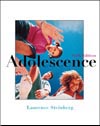The need for both food and sleep changes rapidly during the transition from
childhood into adolescence. In addition to just making you feel bad, lack of
sleep and poor eating habits are associated with lower cognitive functioning,
depression, and low self-esteem. Each of these sites provides more information
about these needs.
As a college student, you may not be surprised to learn that the The National
Institutes of Health (NIH) have identified adolescents and young adults (ages
12 to 25 years) to be at at high risk for problem sleepiness (NIH, 1997). Learn
more about sleep by accessing the following resources:
Adolescents' bodies are changing at the same time they are given more choice
over their food and their schedules become more harried, making it difficult
for them to eat regular meals.
 |
1 |  | 
Ben is undergoing puberty. The word "puberty" refers to... |
|  | A) | the ages between 12 and 16 years old |
|  | B) | the process of attaining adult social status |
|  | C) | the emergence of more sophisticated forms of thinking |
|  | D) | the physical changes that make a person capable of reproduction |
 |
 |
2 |  | 
Which of the following are physical manifestations of puberty? Check all that apply. |
|  | A) | The growth spurt |
|  | B) | A decrease in the capacity of the heart and lungs |
|  | C) | Changes in body composition |
|  | D) | The development of primary sex characteristics |
|  | E) | The development of secondary sex characteristics |
|  | F) | The development of tertiary sex characteristics |
 |
 |
3 |  | 
Highly specialized substances secreted by one or more endocrine glands are |
|  | A) | amino acids |
|  | B) | hormones |
|  | C) | gonads |
|  | D) | enzymes |
 |
 |
4 |  | 
Prenatal exposure to hormones shapes the brain in ways that may not be apparent until childhood or adolescence. This refers to the |
|  | A) | activational role of hormones |
|  | B) | set point |
|  | C) | organizational role of hormones |
|  | D) | asynchronicity in growth |
 |
 |
5 |  | 
The pituitary gland, hypothalamus, and gonads are involved in a system that helps trigger the onset of puberty. A specific name for this system and its function is |
|  | A) | feedback loop |
|  | B) | adrenarche |
|  | C) | menarche |
|  | D) | metabolism |
 |
 |
6 |  | 
Jesse, a 10th grader, is at football practice and gets into an argument with the coach. At dinner that night, his parents notice that he is irritable and in a bad mood. His negative mood is probably attributable to |
|  | A) | hormones |
|  | B) | his parents |
|  | C) | his argument with the football coach |
 |
 |
7 |  | 
What are some of the risks related to early maturation in girls? Check all that apply. |
|  | A) | School problems |
|  | B) | Use of alcohol |
|  | C) | Lower rates of depression |
|  | D) | Decreased popularity with peers |
|  | E) | Higher rates of anxiety |
 |
 |
8 |  | 
Why are early maturing girls at risk for involvement with drugs, delinquency, and sex? |
|  | A) | Parents of early maturing girls are less likely to monitor their daughters' behavior than are parents of on-time girls. |
|  | B) | Early maturing girls spend time with older adolescents, particularly older boys who initiate them into these activities. |
|  | C) | Early maturing girls have lower self-esteem, which causes them to seek out these activities. |
 |
 |
9 |  | 
Grace, a 14-year-old, has already completed most of her pubertal development. It seems to her that her parents now give her a lot of responsibilities and are more disappointed than they used to be when she makes a mistake. These changes are probably due to |
|  | A) | hormones |
|  | B) | reactions of her parents to Grace's physical development |
|  | C) | the emotional maturity that accompanies puberty |
|  | D) | changes in Grace's self-image |
 |
 |
10 |  | 
What strategy would be most helpful for parents to use with an early-maturing daughter? |
|  | A) | Buying her beauty magazines |
|  | B) | Waiting to discuss puberty until she is older |
|  | C) | Emphasizing a variety of the daughter's skills and good qualities |
|  | D) | Encouraging her to spend time with older peers |
 |



 2002 McGraw-Hill Higher Education
2002 McGraw-Hill Higher Education